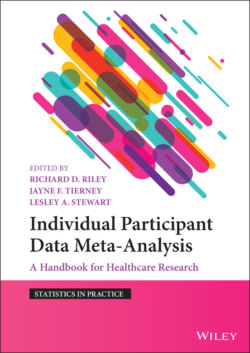Читать книгу Individual Participant Data Meta-Analysis - Группа авторов - Страница 64
3.12 Additional Planning for Prospective Meta‐Analysis Projects
ОглавлениеAs introduced in Chapters 1 and 2, prospective meta‐analysis projects are a particular type of meta‐analysis in which the research questions are specified and collaborations established before the results of any of the component trials are known. Although they can be completed using aggregate data once the trials are completed, they are more commonly undertaken using IPD. They can be set up to bring trials that are already underway together, or can be initiated by convening a group of interested parties at the design stage to create a set of trials that will ultimately contribute to a new meta‐analysis. The latter may be particularly useful in tackling emergent health problems and new technologies and in addressing research questions in rare conditions or small populations, where any single trial would struggle to build a persuasive case that it could provide robust results. An excellent overview of the role and operations of prospective meta‐analysis is given by Seidler et al.86
There are many similarities between prospective and IPD meta‐analyses of existing trials, particularly in terms of the analytic techniques used (Part 2) and in the collaborative ethos within which they operate. However, prospective IPD meta‐analyses additionally require management within each of the partner trials, as well as managing the overarching and inter‐trial collaborations, which may last for many years. Even more time, thought and consultation are likely to be required when planning a prospective meta‐analysis project, particularly for those started from scratch, given that component trials must each be designed in addition to the overarching IPD meta‐analysis project. Inter‐dependencies between trials may need to be considered and complex governance mechanisms put in place. It may take considerable time to develop collaborations and agree management structure and responsibilities between collaborators, and to get funding in place.
In addition to funding for the central coordination and research team (which will be similar to those described in Sections 3.5, 3.7 and 3.8), funding is required for each trial. Each trial will need to obtain its own ethical approval according to the requirements of the jurisdiction in which it is carried out. Those designed from the outset as part of the meta‐analysis project should be clear about this and careful explanation of statistical power will be needed. Consideration of data and patient confidentiality may need greater explanation, as by design the data from any one trial will be shared beyond the immediate trial team. Prospective meta‐analysis projects that are set up to include trials that are already underway may need to support amended ethics approval for included trials.
Issues around establishing and managing collaborations are similar to those already described for retrospective IPD meta‐analyses (Section 3.1). However, motivating factors may differ, with opportunity for greater mutual benefit, additional publications and academic reward if the overarching prospective meta‐analysis makes it possible to conduct an individual trial that on its own would be difficult to justify and obtain funding for. As for retrospective IPD meta‐analysis projects, collaborative terms need to be clear and transparent. For example, an explicit authorship policy should be in place from the outset and agreement reached. Similarly, transparent processes and a priori agreements, on the relative timing of publication of individual trials and the overarching prospective meta‐analysis, are crucial for building and maintaining trust within a prospective meta‐analysis collaboration. As with IPD meta‐analysis projects of already completed trials, good communication is essential.
Prospective meta‐analyses are necessarily long‐term projects. For those designed from scratch, an intensive set‐up phase will be followed by a quieter period waiting for individual trials to complete (depending on the nature of the health condition and questions and outcomes addressed, this can take several years), followed by an intensive analysis phase. For example, in NeoPROM (Neonatal Oxygenation Prospective Meta‐Analysis) five groups prospectively planned to conduct separate, but similar, trials assessing different target ranges for oxygen saturation in preterm infants. The project was established in 2005.86 The first trial started in 2005, the last trial results became available in 2016 and the final prospective meta‐analysis was published in 2018 (indicating that around two years were required for the final stage of assembling the trial data, performing the IPD meta‐analysis and agreeing and reporting project conclusions, which is not dissimilar to the time scale required for a retrospective IPD meta‐analysis project; Section 3.7).87 For those that bring together trials that are already underway, the processes involved will be very similar to those already described in this chapter for retrospective IPD meta‐analysis projects, although project timing will need careful consideration (end dates for ongoing trials are often unpredictable, making it difficult to plan when the data assembly and meta‐analyses are to be done – which may have knock‐on implications for funding). Where there are some existing trials, prospective meta‐analyses could be nested within a wider IPD meta‐analysis combining the benefits of both approaches. A summary of options is given within the article by Seidler et al.86
It would be unwise to attempt to initiate a new prospective meta‐analysis without involvement of someone with prior experience of these unique projects.
